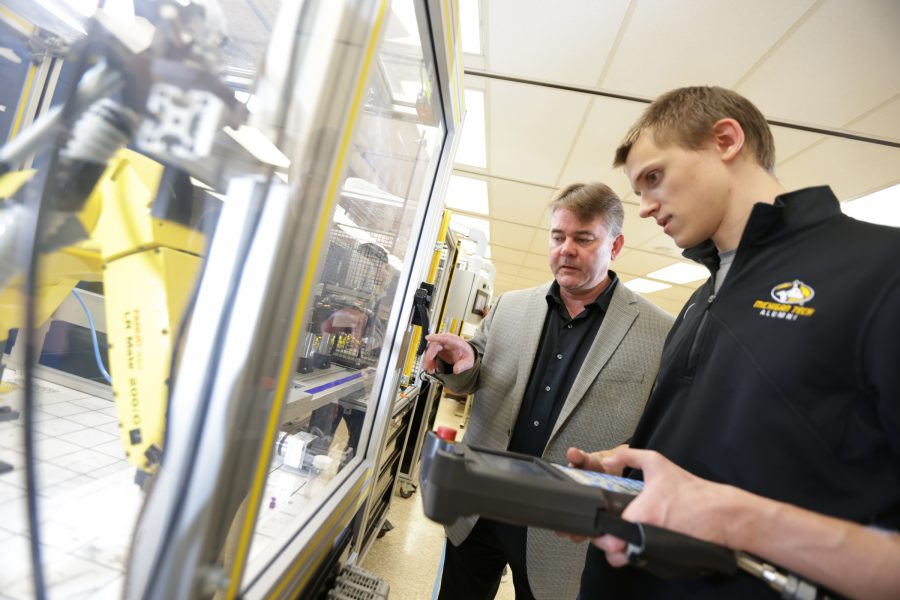


Training an Advanced Manufacturing Workforce:
Michigan Tech and West Shore Community College Collaborate to Prepare a New Generation of Mechatronics Professionals
The U.S. manufacturing sector has seen significant changes in the past decades. Digital technologies, automation, and data analytics have revolutionized the way products are designed, produced, and delivered.
A key driver of this revolution is the emerging field of mechatronics, which focuses on the development and use of automation for industrial applications. With mechatronics, the manufacturing sector is achieving unprecedented levels of automation, flexibility, and efficiency, and it is expected to remain a driving force in manufacturing.
Training a new generation of professionals to lead this surge in advanced manufacturing is key. However, educational programs to train this workforce are few, and the existing workforce cannot meet current and future demand.
To answer this need for advanced manufacturing training, West Shore Community College, Scottville, Mich., and Michigan Technological University, Houghton, Mich., are collaborating to put this much-needed education in place.
Awarded to Michigan Tech in early 2023, a grant from West Shore Community College, through Accel Robotics, got things started. With the project award, a tele-operated robotics work cell was built at WSCC. The new work cell and accompanying equipment enable access to a remotely controlled physical robot arm that can be programmed, tested, and viewed in real-time by offsite users. Regional employers have already begun to use the remote work cell to help improve their manufacturing processes.
Along with WSCC faculty and staff, Michigan Tech professor Alex Sergeyev, Applied Computing, associate professor Scott Kuhl, Computer Science, and two Michigan Tech graduate students developed the work cell. Sergeyev says that Michigan Tech hopes to expand and build a similar remotely controlled robot at MTU.
“We’ve been working on this with WSCC for almost 10 years and now we’re seeing some fruit of the cooperation,” says Sergeyev, director of the MS in Mechatronics program at Michigan Tech.
“Our idea was to create a method of hands-on mechatronics training where users can control a robot without the need to come to campus. It opens new possibilities for industry, colleges, and K-12 schools to teach robotics without the need to transport students to the site,” says Sergeyev. “I think it’s the first time in academia that this has happened, so it’s fantastic that the grant created this system that employers and community partners can use.”
Further, to provide additional avenues to train future industrial automation and robotics workers, WSCC has added to their degree programs an Associate of Science in Robotics and Advanced Manufacturing. The new curriculum is also designed to create a smooth pathway to a four-year degree, encouraging community college graduates to extend their education.
WSCC will ease into delivering the new curricula by conducting small-group workforce training on the robotics work cell over the next several months. The first cohort of academic students is anticipated in fall 2024.
WSCC has become a FANUC-certified institution, which means that the college can award FANUC certifications to students who complete the WSCC robotics courses. FANUC—Fuji Automatic NUmerical Control—is the largest robot manufacturer in the world and FANUC certifications are highly sought credentials by employers.
Taking this endeavor to a higher level, a recently awarded three-year research and development grant from the National Science Foundation (NSF) creates a partnership comprising Michigan Tech, Gogebic Community College, West Shore Community College, eight industrial partners, and three nonprofit organizations.
Titled, “Beginnings Track: Experiential Learning for the Mechatronics Workforce in the Upper Peninsula and Northern Michigan,” the collaborative project aims to add additional learning opportunities in mechatronics. Various related professional development activities will further prepare participants for their careers and expand their network with industry collaborators. Further, this project will foster a community among cohorts through professional mentoring and community-building activities to promote a sense of belonging.
Sergeyev is the principal investigator (PI) on the $999,930 “Beginnings Track” research and development grant. MTU co-PIs are Vinh Nguyen, Mechanical Engineering-Engineering Mechanics (ME-EM), David Labyak, Manufacturing and Mechanical Engineering Technology (MMET), Paniz Hazaveh, Applied Computing (AC), and Linda Wanless, Center for Teaching and Learning (CTL).